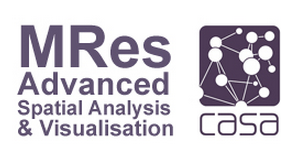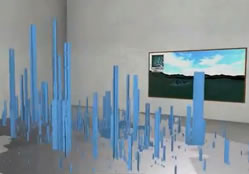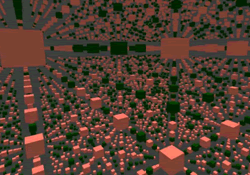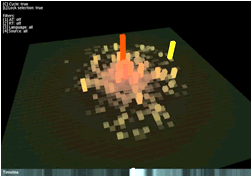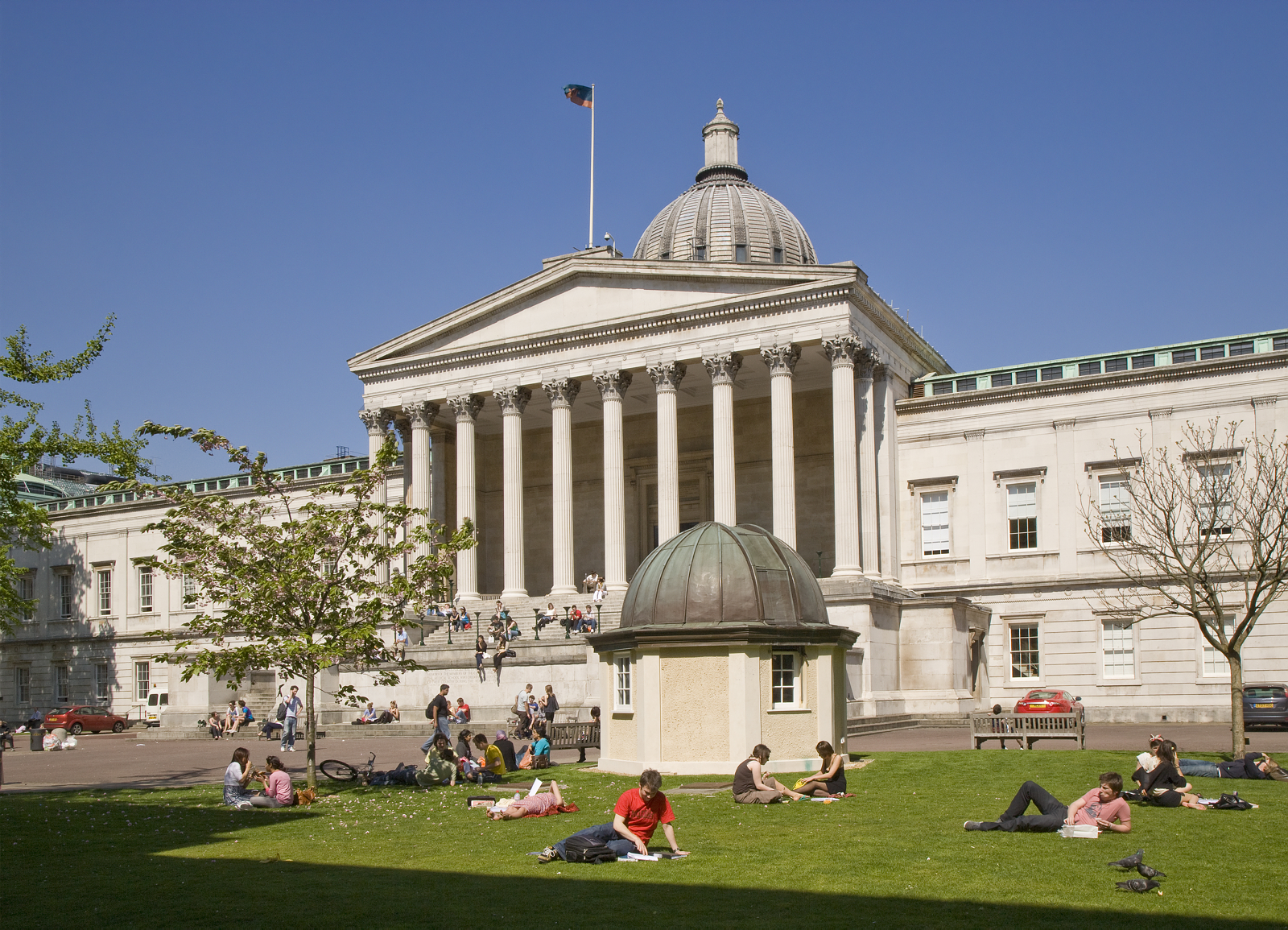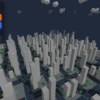We are pleased to announce 2 fully funded PhD studentships at the Centre for Advanced Spatial Analysis, University College London.
Full details below, its a unique opportunity to carry out new cutting edge research in the field of smart cities:
PhD 1 – CASA and The Greater London Authority
Funding Type: Impact Award
Project Title: PhD Studentship: Smart Cities and OpenData: iCity
Funding Duration: 3 years
Annual Stipends: Year 1: £15,980pa (tax free) + tuition fees + travel allowance, Year 2: £16,380pa (tax free) + tuition fees + travel allowance, Year 3: £16,790pa (tax free) + tuition fees + travel allowance
Department: UCL Centre for Advanced Spatial Analysis, The Bartlett
Company: The Greater London Authority (Economics)
Closing Date: 13th August 2012
Start Date: 1st October 2012
About the research
The essence of this PhD studentship is to pose and answer the question: “Can open access to a city’s data feed and infrastructure create a positive impact on its inhabitants, influence policy and enhance sustainability, well-being and cross cultural interaction?”
The research proposal is in collaboration with the Greater London Authority (GLA), specifically via the European Funded ‘iCity’ project which aims to help develop the concept of Smart Cities by encouraging the collaboration of private sector developers with the public sector to deliver services of use to the people who live, work and play in our cities.
Building on the success of open data projects such as the London Datastore, the studentship will explore best practices through example and documentation into how public infrastructure and data could be made available for developers to create services for the public. Cities already invest heavily in infrastructure for their operational running. For London this includes amongst other things CCTV cameras, environmental sensors, Wi-Fi enabled tube stations, electronic ticketing, and public transport information systems. iCity aims to optimise this existing investment by working in partnership with the private sector. The resulting services can be mobile, web based or for use by public sector to provide services to the public.
The iCity project is developing a shared technological platform to integrate the 4 participant cities: Barcelona, Bologna, Genoa and London. For further details see http://www.icityproject.com/ The studentship will build research links with these partners and through developing online and mobile bespoke solutions detail how smart use of open access to a city’s data feed, via online and mobile applications, can create a positive impact on its inhabitants, influence policy and enhance sustainability, well-being and cross-cultural interaction.
The project opens up exciting research opportunities to better understand the use of digital technologies for improving the ways that people interact with their urban environment and each other. It also enables for the first time, access to public sector infrastructure for research uses. For example, what use could be made of the increasingly ‘live’ data feeds, as visualised on CASA’s CityDashboard (http://www.citydashboard.org).
Background
The London Datastore was launched by the GLA in 2010 (http://data.london.gov.uk) with the aim to allow citizens to access the data that the GLA and other public sector organisations hold, and to use that data however they see fit – free of charge. The GLA is encouraging other public sector organisations into releasing their data too. The studentship will be at the heart of this development with a view to aiding the development of data standards, online and mobile application development.
Many applications have already been created using this open data source with the associated commercial return. Applications include accessing live running transport data to help people with their journey planning, visualising crime data to help with police accountability and cycle hire apps that show the nearest locations of cycle docking stations and if there are any stands free. In CASA, we are building a real time information system that lets users query tube and bus networks so that we can figure out the best ways to travel as part of our Oyster card network project. iCity will build on this initial start. Expected medium term impacts include a wider variety of applications available for citizens and better quality information sources for applications that already exist.
Supervision Arrangements
The primary academic supervisor will be Dr Andrew Hudson-Smith FRSA. Dr Andrew Hudson-Smith is Director and Deputy Chair of the Centre for Advanced Spatial Analysis (CASA), he is Editor-in-Chief of Future Internet Journal, an elected Fellow of the Royal Society of Arts and Course Founder and Director of the MRes in Advanced Spatial Analysis and Visualisation at University College London.
The industrial supervisor will be Dr Margarethe Theseira, Senior Manager at GLA Economics.
About CASA
The Centre for Advanced Spatial Analysis (CASA) is a centre in the Bartlett Faculty of the Built Environment (The Bartlett). The Bartlett is University College London’s world-leading faculty for multidisciplinary education and research for the built environment. CASA’s focus is to be at the forefront of what is one of the grand challenges of 21st Century science: to build a science of cities from a multidisciplinary base, drawing on cutting edge methods, and ideas in modelling, complexity, visualisation and computation. Our current mix of architects, geographers, mathematicians, physicists, archaeologists and computer scientists make CASA a unique department within UCL.
CASA is central to this new science, the science of smart cities, and the relationship to city planning, policy and architecture in its widest sense. The focus is on advancing the state of the art through the application of computer models, data visualisation techniques, innovative sensing technologies, mobile applications, data visualisation and urban and regional theory linked to city systems.
About The Greater London Authority
The GLA was created by the GLA Act of 1999 and formally established on 3 July 2000. The GLA Act of 2007 introduced additional and enhanced powers for the Mayor of London and the London Assembly in several areas including housing, planning, climate change, waste, health and culture.
Our three main areas of responsibility are: economic development and wealth creation, social development and environmental improvement. These are underpinned by six statutory themes of equality of opportunity, sustainable development, health, health inequalities, climate change (covering both adaptation and mitigation) and community safety.
Eligibility Criteria
Residency
Academic Qualifications
The applicant should possess a good honours degree (1st Class or 2:1 minimum); an MSc/MRes in Advanced Spatial Analysis and Visualisation, Computer Science, Geoinformatics, Computational Social Sciences, or related disciplines. You need to be familiar with geographic information and software development, and be able to work with a team that will include computer scientists, social scientists, strategists and policy makers.
How to apply
Your application will only be considered if you complete both parts of the application process.
- Applicants should complete the online application form on the UCL Postgraduate Application and Entry page (http://www.ucl.ac.uk/prospective-students/graduate-study/application-admission). You should ensure your references; transcripts etc are in place so your application can be considered in time. Please enter the programme as Research Degree: UCL Centre for Advanced Spatial Analysis (RRDCASSING01); and name Dr Andrew Hudson-Smith as the proposed supervisor.
- In addition, applicants should email the following to Sonja Curtis at s.curtis@ucl.ac.uk
o a cover letter (addressed to Dr Andrew Hudson-Smith, UCL CASA) of a maximum one page in length, demonstrating how and why you think you are suitable for this studentship;
o a two-page research proposal based on the project description;
o a CV.
PhD 2 – CASA
Funding Type: EPSRC Studentship
Project Title: Smart Urban: Sensors, OpenData, The Crowd and the Internet of Things
Funding Duration:3 years
Annual Stipends:Year 1: £15,980pa (tax free) + tuition fees + travel allowance, Year 2: £16,380pa (tax free) + tuition fees + travel allowance, Year 3: £16,790pa (tax free) + tuition fees + travel allowance
Department: UCL Centre for Advanced Spatial Analysis, The Bartlett
Closing Date: 13thAugust 2012
Start Date: 1stOctober 2012
Vacancy Information
Three year funded PhD studentship in Smart Urban: Sensors, Opendata, The Crowd and the Internet of Things based at the Centre for Advanced Spatial Analysis, University College London.
Studentship Description
Emerging open source sensors, connected objects, diverse data feeds and crowd-sourcing techniques are moving us towards a new age in our understanding of place and space. Working on a macro ‘smart-city’ scale down to the micro ‘hyper-local’ level we are able to collect and analyse data relating not only to the external operations of the city but increasingly into the buildings themselves. We are connecting, sensing, monitoring and visualising our environment, people and objects at an every increasing rate, creating need for spatial analysis combined with new research methods to aid our understanding of these emerging data feeds.
The research will focus on deploying, collating, visualising and communicating various data feeds to enhance our understanding of the ‘smart cities’ and ‘smart places’ towards creating a hypothesis around smart urban systems. From using motion sensors, such as the Xbox Kinect, though to emerging innovative devices such as the ‘Air Quality Egg’ combined with feeds from various data stores, check-ins and onwards to connected devices via the Internet of Things the candidate will require an innovative approach to research.
Supervision Arrangements
The primary academic supervisor will be Dr Andrew Hudson-Smith FRSA.
Dr Andrew Hudson-Smith is Director and Deputy Chair of the Centre for Advanced Spatial Analysis (CASA), he is Editor-in-Chief of Future Internet Journal, an elected Fellow of the Royal Society of Arts and Course Founder and Director of the MRes in Advanced Spatial Analysis and Visualisation at University College London. He is the author of ‘Digital Urban’ http://www.digitalurban.org. About CASA
The Centre for Advanced Spatial Analysis (CASA) is a centre in the Bartlett Faculty of the Built Environment (The Bartlett). The Bartlett is University College London’s world-leading faculty for multidisciplinary education and research for the built environment. CASA’s focus is to be at the forefront of what is one of the grand challenges of 21st Century science: to build a science of cities from a multidisciplinary base, drawing on cutting edge methods, and ideas in modelling, complexity, visualisation and computation. Our current mix of architects, geographers, mathematicians, physicists, archaeologists and computer scientists make CASA a unique department within UCL.
CASA is central to this new science, the science of smart cities, and the relationship to city planning, policy and architecture in its widest sense. The focus is on advancing the state of the art through the application of computer models, data visualisation techniques, innovative sensing technologies, mobile applications, data visualisation and urban and regional theory linked to city systems.
Eligibility Criteria
Residency
Academic Qualifications
The applicant should possess a good honours degree (1st Class or 2:1 minimum); an MSc/MRes in Advanced Spatial Analysis, Computer Science, Geoinformatics, Computational Social Sciences, or related disciplines. You need to be familiar with geographic information and software development, and be able to work with a team that will include computer scientists, social scientists, strategists and policy makers.
How to apply
Your application will only be considered if you complete both parts of the application process.
- Applicants should complete the online application form on the UCL Postgraduate Application and Entry page (http://www.ucl.ac.uk/prospective-students/graduate-study/application-admission). You should ensure your references; transcripts etc are in place so your application can be considered in time. Please enter the programme as Research Degree: UCL Centre for Advanced Spatial Analysis (RRDCASSING01); and name Dr Andrew Hudson-Smith as the proposed supervisor.
- In addition, applicants should email the following to Sonja Curtis at s.curtis@ucl.ac.uk
o a cover letter (addressed to Dr Andrew Hudson-Smith, UCL CASA) of a maximum one page in length, demonstrating how and why you think you are suitable for this studentship;
o a two-page research proposal based on the project description;
o a CV.



